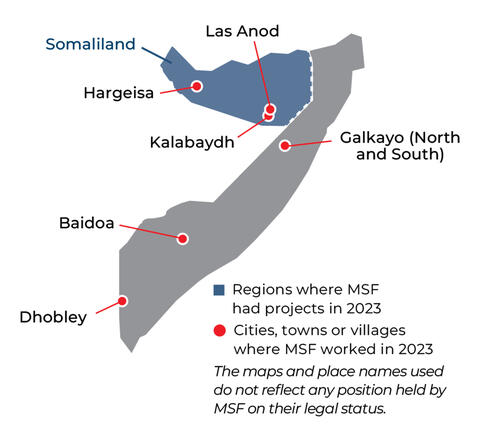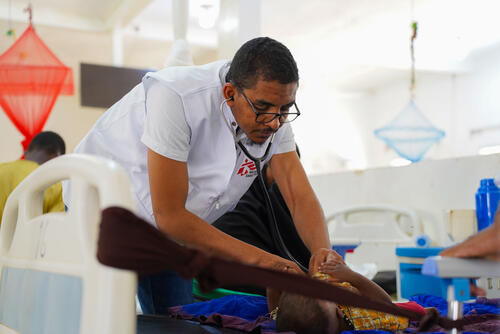In 2023, the dire humanitarian situation was exacerbated when two years of drought were followed by severe floods, affecting over two million people. Around 1.2 million were displaced* and 118 died, against a backdrop of longstanding conflict and recurrent disease outbreaks.
In Baidoa, the capital of South West state, our teams provided healthcare for people displaced by conflict and flooding. At Bay regional hospital, our services included comprehensive emergency obstetric and neonatal care, outpatient clinics, and an inpatient ward for paediatric healthcare, as well as therapeutic feeding centres. We decentralised general healthcare in seven locations within the town to facilitate referrals for maternal and child health services to Bay regional hospital for specialised care.
In Galkayo North, Puntland state, we continued to support the maternity and paediatric departments at the regional hospital and treat malnutrition and tuberculosis (TB). We also sent mobile teams to 23 camps for displaced people. In Galkayo South, we supported the Mudug Development Organization’s hospital, by running maternal and child health services, treating malnutrition and TB, and responding to emergencies.
In June, we handed over our multidrug-resistant TB project to the Ministry of Health Development in Somaliland, where our support with case identification, diagnostics and holistic care for patients since 2019 had successfully led to reduced fatality rates and improved cure rates.
We maintained basic and specialised healthcare activities in Kalabaydh in Sool region, but were forced to withdraw our services from Las Anod general hospital in July due to high insecurity.
In December, we closed our project in Dhobley, South Jubaland, close to the border with Kenya. Since 2017, our teams had delivered healthcare through mobile clinics, treating malnutrition and infectious diseases, conducting outpatient consultations and measles vaccinations, responding to cholera outbreaks, performing cataract surgery, and distributing eyeglasses.
*UNOCHA





